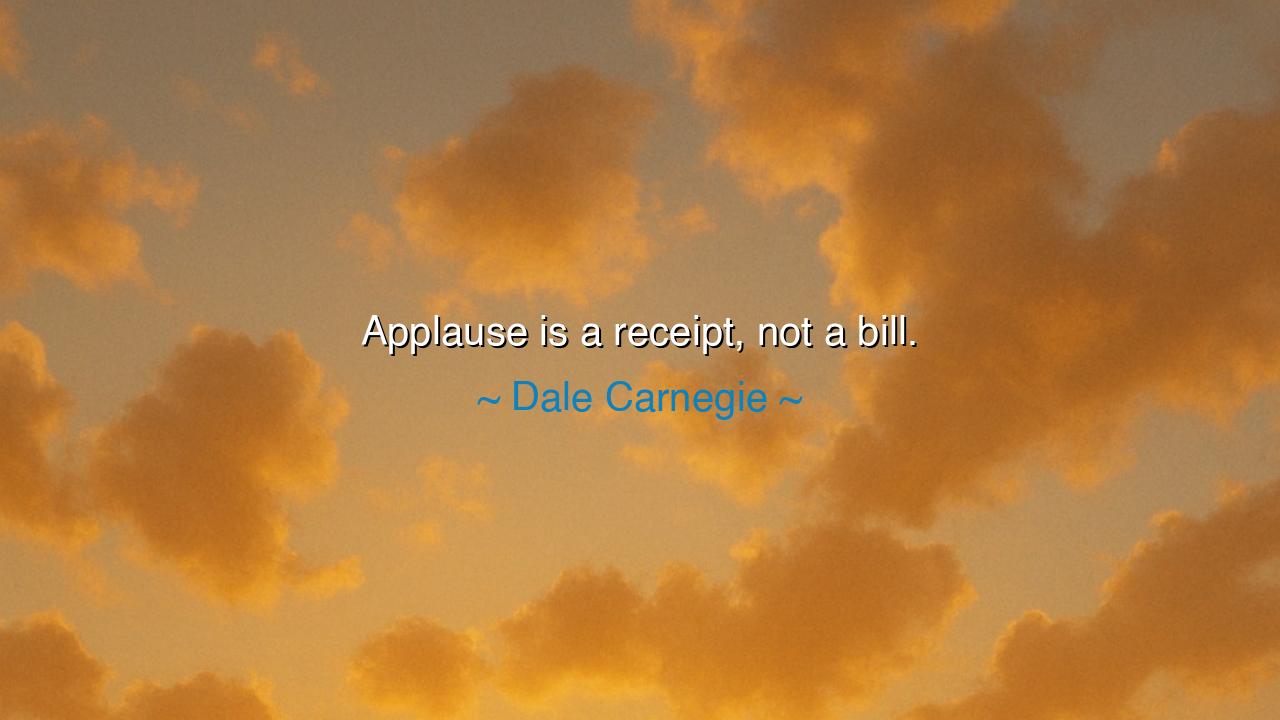
Applause is a receipt, not a bill.






Recognition is the echo of deeds well done, not the reason they are performed. When Dale Carnegie declared, “Applause is a receipt, not a bill,” he revealed a profound truth about the nature of success and motivation. Applause is like a receipt—it is proof of work completed, a sign that others have witnessed and appreciated your efforts. It is not a bill, a debt you owe to anyone, nor a demand that should enslave your spirit. In other words, praise should be received with gratitude, not pursued as the ultimate goal.
This teaching warns against the trap of external validation. Many souls live their lives chasing the clamor of applause, shaping their actions to please others rather than to follow their true calling. Such people become prisoners of public opinion, rising and falling with the fickle tides of approval. Carnegie, a master teacher of human relations, reminds us that applause comes only after the labor, and it should never be the force that drives our work. True greatness flows from purpose, not from the hunger for praise.
History offers a vivid example in the life of Abraham Lincoln. During the darkest days of the American Civil War, he faced relentless criticism. Many despised his decisions, and the applause he received was scarce. Yet Lincoln did not act to win popularity—he acted to preserve the Union and end slavery. When victory came and the crowds finally cheered, their praise was not a bill demanding repayment, but a receipt acknowledging the sacrifices already made. Lincoln’s leadership shows that applause is most meaningful when it follows duty fulfilled.
The opposite is seen in the tragic tale of Julius Caesar. Beloved by the Roman masses, he grew intoxicated by their cheers. For him, applause became a bill, a constant demand to provide ever more spectacles, victories, and power. In serving the expectations of the crowd, he set in motion events that led to his assassination and the fall of the Roman Republic. His fate reminds us of the peril of living for applause rather than principle.
On a personal level, this wisdom calls us to inner strength. Whether in work, art, or relationships, we must act from a place of integrity and vision. When applause comes, it should be welcomed as a sign that our efforts have borne fruit. But when silence or criticism greets us, we must not falter, for our worth does not depend on the noise of the crowd. The receipt may come late or not at all, but the value of our work remains.
Let this truth be carried forward through the ages: applause is a symbol, not a sustenance. It marks the completion of a noble deed but must never become the reason for its birth. Work with courage, give with generosity, and live with purpose. The world’s recognition will follow in its own time, and when it does, take it not as a burden, but as a simple receipt, proof that you have given your best to the tapestry of life.






AAdministratorAdministrator
Welcome, honored guests. Please leave a comment, we will respond soon